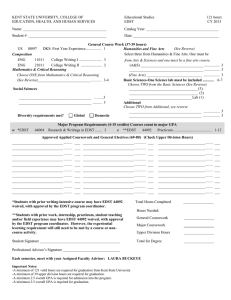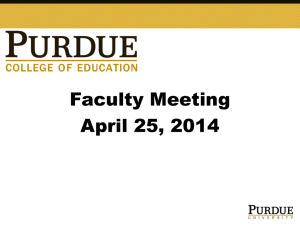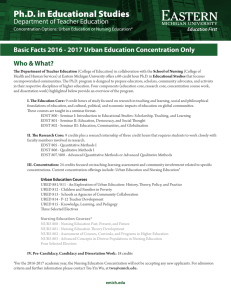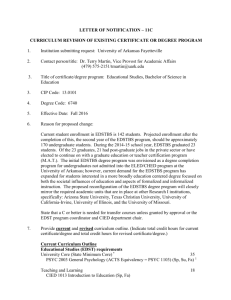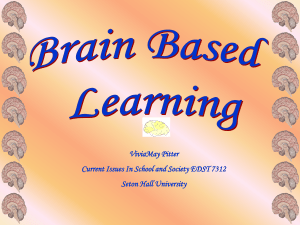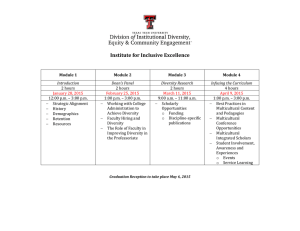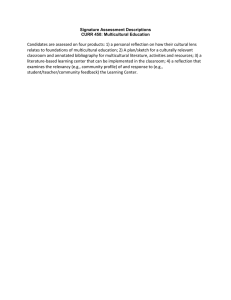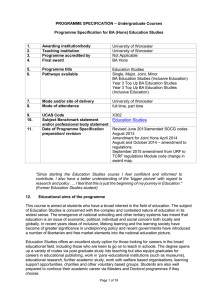Educational Studies APIII
advertisement
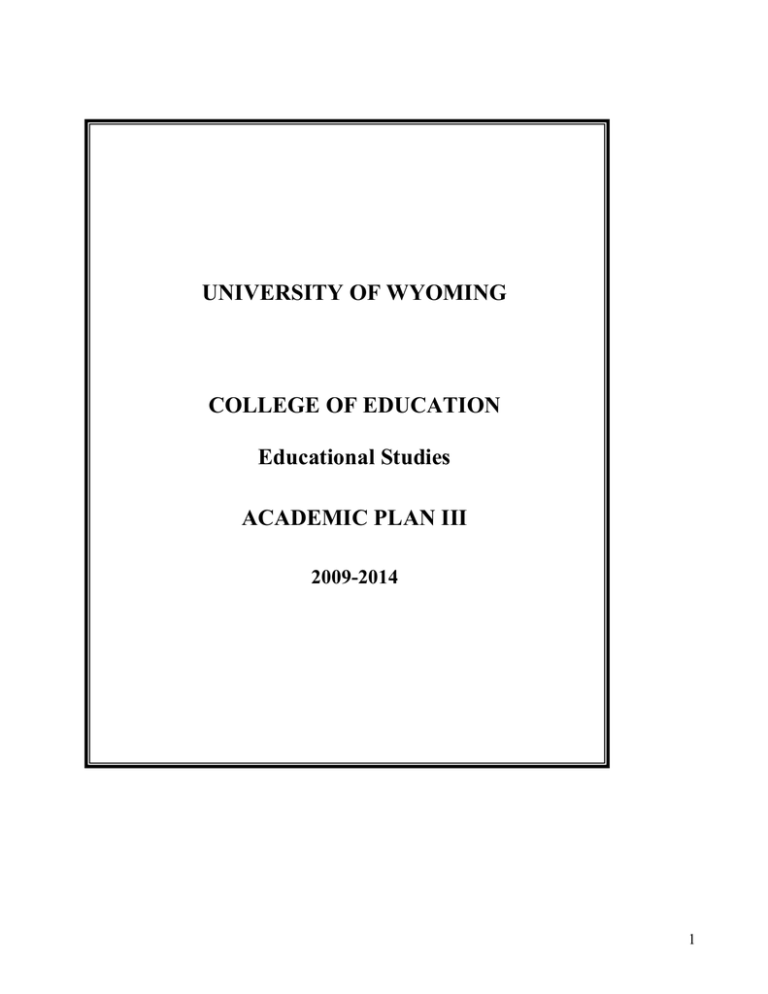
UNIVERSITY OF WYOMING COLLEGE OF EDUCATION Educational Studies ACADEMIC PLAN III 2009-2014 1 Department of Educational Studies (EDST) – Academic Plan 2009 - 2014 The Department of Educational Studies offers the foundation courses for the undergraduate and post baccalaureate teacher education programs. The department also shares the delivery of Curriculum and Instruction graduate programs with the Departments of Elementary Education and Secondary Education. We currently have 12 full time faculty members (Castaneda, Cho, Jaime, Janak, Kambutu, Keefauver, Kleinsasser, Persichitte, Rios, Roxas, Trent, Zorko), and we are excited to have Susana Flores joining our department in January 2009. EDST serves as department home for Dean Kay Persichitte and for the Wyoming School University Partnership (WSUP) Director, Audrey Kleinsasser. We annually offer approximately 125 credit hours at the undergraduate level, and our class sizes average above 24 students. Our mission in Educational Studies is to engage in teaching, service and scholarship that supports democratic and multicultural education goals and principles. Our aim is to become a nationally recognized department, known for programs and research that document high levels of authentic engagement and learning for all involved stakeholders (students/preservice teachers, EDST faculty, PreK-12 students and teaching partners…). This next iteration of our academic plan is designed to achieve these aims via a set of specific action items. We are pleased to report our accomplishment of most all action items outlined in our 2004-2009 plan. A detailed accounting of progress on all 2004-2009 action items was provided in the EDST Annual report submitted Spring 2008. A summary for each of the EDST 10 general goal areas for 2004-2009 follows: Goal 1: Revise Curriculum vis-à-vis new COE Standards. Our aims to revise and align our course curricula and common assessments have been largely accomplished, though we acknowledge this is necessarily an ongoing, cyclical process. Goal 2: Emphasize Standards Central to the Department in Teacher Preparation (Democratic Learning Environments and Diverse Learners). Our goal of emphasizing specific WTEP standards, especially standards related to democracy and diversity, has also been realized and evidenced in both course content and faculty scholarship, though more work in this area remains. We, as an educational community, continue to fall short of the aims outlined in the No Child Left Behind Act of 2001, equity and high levels of learning for all children. Until achieved, we must be vigilant in pursuing these unrealized democratic aims. Goal 3: Reconsider/Refigure Standards/Assessment Course. All action items complete. Goal 4: Develop Program Level Assessment of Student Competence in Teacher Preparation All action items complete and ready for next cyclical review and revision. Goal 5: Engage Students with Diverse Field Experiences (including Denver). Here again, all action items have been completed, yet we plan to continue to bolster student learning and proficiency through the provision of multiple authentic field experience/practicum opportunities. 2 Goal 6: Advance Professions and Issues Critical to the Region (Multicultural Teacher Education) All Action items complete; emphasis on goal area and multicultural teacher education continue. Goal 7: Lead Diversity/Professional Development Impetus Action items complete; department will continue to provide leadership and professional development. Goal 8: Reconsider/Refigure Class Size and Employment/Department Needs. Action items completed. EDST class sizes are larger. Key follow up includes assessing student learning in larger classes – Are we able to provide and document high levels of proficiency with larger class size? Goal 9: Provide a Quality Induction Goal not accomplished. Our goal for more formal induction for new instructors has yet to be realized, however, we are hopeful this item may be addressed at the college level. Goal 10: Engage in a new teacher preparation model. Action item discussed but not implemented. Creation of the Future 3 and College of Education Planning 2009 - 2014 Both university and college level planning documents have influenced the creation of the EDST Department Action Items included in this document. Explicit connections to university and college planning include: Connections to Creation of the Future 3: o Motif 2: Areas of Distinction – Professions Critical to State and Region o Motif 3: Access to Higher Education – Student Success and Inclusiveness o Motif 4: Fostering Excellence – American Indian Center o Motif 5: Cultivating Leadership - Professions Critical to the Region’s Future and Education Excerpts from COE Academic Plan 09-14 o Action Item 4…infuse the fundamental concepts of the Agenda for Education in a Democracy and the central role of schooling within a democratic society across internal and external constituents. o Goal: Respond to the reality that our nation’s rich diversity continues to increase and our world is increasingly interconnected, both economically and politically… o Action Item 8: Capitalize on the growing number of faculty across several departments in the CoEd with expertise to support multicultural and culturally sensitive education, teaching diverse student populations, and supporting students learning English as a second language at all levels (P-16) by building on this nucleus of expertise. o Action Item 9: Implement the certificate program for Teachers of Native American Children; investigate opportunities for collaboration with the Wind River Tribal College and the American Indian Center, and possible state certification in this area by the Wyoming Professional Teaching Standards Board. o Action Item 12: Charge the newly created CoEd Advisory Council on Diversity with prioritization and identification of action items related to multiculturalism, diversity, and international opportunity… 3 EDST Goal Areas and Action Items 2009 - 2014 Goal 1: Democratic, Multicultural Teacher Education – As noted in the COE Conceptual Framework, our guiding document, democratic understandings, skills and dispositions, and multicultural, socially just perspectives are essential for teachers in our increasingly diverse nation. In order to realize the foundational tenets and principles of US democracy, we believe the following action items are important aims in pursuing an equitable, high quality education for our students/preservice teachers, and in turn will allow them to provide the same for their students. o Action item 1 - Continue and expand integration of curricula that explicitly addresses teaching and learning in a democracy and multicultural/diversity education in all EDST courses. Associated curricular topics include: language diversity; teaching English language learners; educating diverse populations; GLBTQ issues; American Indian Education; inclusion and special needs learners; urban education, and rural education. o Action item 2 - Increase opportunities for preservice teachers to have more diverse and/or more extensive field experiences (including international). Specific practicum and field work to be explored include: urban focused section of EDST 3000 with Denver Public School (DPS) practicum; expansion of DPS and rural school practicum for EDST 2480; optional and/or required field experiences in schools on the Wind River Indian Reservation (WRR) for EDST 2480 & 3000; education focused International travel opportunities; stand alone field work courses (e.g., intensive week long experiences on the WRR, in rural schools, or in DPS before or after semesters), and school/community based service learning options. o Action item 3 - Restructure EDST assessment system; identify key skills and knowledge (as indicated in WTEP Content and Performance Standards) to be evaluated; adapt/create common assessments and rubrics aligned with these proficiencies; streamline CEID data entry processes. Goal 2: Recruitment and Retention – The data here are clear, while our public school student populations continue to rapidly diversify, our teaching force remains largely white, female, and monolingual. Recruiting preservice teachers that better reflect our country’s demographics is an essential aim for teacher educators across the nation. Wyoming is no exception. o Action item 4 - Focus and intensify recruitment and retention of diverse student population. Related actions include identification and recruitment of non-declared UW students from underrepresented groups; targeting academically successful and promising high school students; utilization of UW Recruiter in Denver to access and publicize UW WTEP to potential students along Front Range; and explore opportunities to provide structured support (utilizing extant and future UW initiatives, including financial support, and additional college/departmental support) to WTEP students from underrepresented groups to ensure both positive experiences and high levels of learning/academic success. Goal 3: Scholarship – Curricular, instructional, and assessment adaptations and innovations are one piece of our multi-pronged approach toward achieving national prominence. Focused scholarship and research are another. In addition to elevating our program, department, and faculty reputations, it is this same research that informs the 4 data driven decisions that guide our departmental, programmatic, and course level evolutions. o Action item 5 - Increase visibility and impact of EDST faculty members’/department’s research and scholarship; Specifically: participate in educational studies specific conferences; highlight scholarly publications on website; continue to publish articles, chapters, and/or books that align with departmental courses, aims and philosophy; create forums for generating and sharing scholarly work across internal and external audiences; seek opportunities to collaborate in research projects with community colleges and interdisciplinary UW colleagues. Goal 4: Role of Educational Studies Faculty and Department – Our department is in a unique situation. While we contribute in essential, substantive ways to all elementary education, secondary education, and curriculum and instruction degree programs, we do not produce any “majors” or “graduates” per se. We feel it is important to better define the roles we play across the WTEP in an attempt to solidify and evaluate our contributions to education degree programs and also to best capitalize on the immense faculty expertise present in the EDST Department. This action item seeks to accomplish these aims. o Action item 6 - Delineate the roles EDST department and faculty members play in the WTEP specifically and on other levels (university, state, national, international) more generally; Intended actions: highlight WTEP programmatic contributions to multiple degree programs and discuss ways to better connect curricula and assessments across all WTEP (and select other) departments; showcase preservice teacher learning in EDST classes; build national reputations for faculty and department in educational foundations by infusing faculty expertise internally and externally in areas of multicultural and democratic teaching and learning, English as a Second Language/ELL teaching, American Indian education, and international schooling and student populations. Implementation/Timeline EDST ACTION ITEM 1 (CURRICULUM) 2 (FIELD EXPERIENCE) 3 (ASSESSMENT) 4 (RECRUITMENT/RETENTION) 5 (SCHOLARSHIP) 6 (DEPARTMENT ROLE) IMPLEMENTATION/TIMELINE SPRING/FALL 2009 – FALL 2011 SPRING/FALL 2009 – FALL 2012 SPRING/FALL 2009 – FALL 2011 FALL 2009 – SPRING 2014 SPRING/FALL 2009 – SPRING 2014 FALL 2009 – SPRING 2014 5
